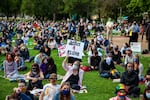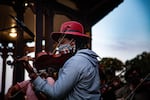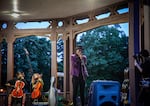
Violinists, violists and cellists of all ages came out to play improvised music at a vigil for Elijah McClain at Peninsula Park in Portland, Ore., Friday, July 3, 2020.
Claudia Meza / OPB
Nearly a hundred string musicians convened in North Portland Friday to issue a musical call for justice for a violinist who died before his time.
Elijah McClain, a Black man from Aurora, Colorado, is remembered by his loved ones as quirky and kind — an introverted animal lover who played his violin for stray cats at an animal shelter. He was walking home from a convenience store last year when a 911 caller reported someone “looking sketchy.” Aurora police put him in a neck hold and medics reportedly injected him with what they called a “therapeutic” dose of a sedative. He had a heart attack on the way to a hospital and died days later.
He was 23.
As protests against racism and police brutality have unfolded in communities large and small across the U.S., McClain’s name has been added to a sad litany, alongside George Floyd, Breonna Taylor, Ahmaud Arbery and other Black people killed by police. And like Floyd, Taylor and Arbery, McClain has become an icon to many participants in a movement for justice that is still unfolding today.

Kinsey Smyth, an activist and dancer, was the first speaker of the evening at the violin vigil for Elijah McClain at Peninsula Park in Portland, Ore., Friday, July 3, 2020.
Claudia Meza / OPB
“Elijah McClain was a 23-year-old human — 23 years old,” Kinsey Smyth of the Portland Civil Rights Collective spoke with a mournful voice Friday, as she stood amongst the cellists, violists, bassists and violinists gathered at Peninsula Park.
“I am 23 years old, to put it into perspective,” she said. “And to hear that a human at 23 years old lost their life, before really their life even got to start, I feel that deep within myself. We’re here not only celebrating and honoring the life of that individual but so many countless lives that have been lost at the hands of those who are supposed to protect us.”
In Aurora last month, some violinists were pepper-sprayed by police in riot gear. They’d been swept up in a Black Lives Matter protest across a park from a vigil for McClain. Karla Mi Lugo, who instigated that vigil, described it as a cathartic ritual of grief.
But in Portland, close to a thousand people, nearly all wearing COVID-19 masks and many carrying Black Lives Matter signs, were audience to a peaceful show, interrupted only by the staccato pops of fireworks and the fiery words of people demanding a better world.

About a thousand people gathered in North Portland on Friday, July 3, 2020, to hear a string vigil for the life of Black violinist Elijah McClain.
Claudia Meza / OPB
As the sun slowly set, a swollen moon climbed above children holding violins, seniors seated with cellos, amateurs playing alongside Oregon Symphony performers, beginners alongside Bravo Youth Orchestra teachers.
Nydelis Ortiz, 30, said it had been a decade since she had played her violin. She tuned her strings and began to practice when she learned about the vigil for McClain. “Music is one of those things that transcends languages, and it’s a way to reach people.”

A young violinist performs at the violin vigil for Elijah McClain at Peninsula Park in Portland, Ore., Friday, July 3, 2020. The crowd was a mix of young and old, with some musicians who had not touched their instruments in years. Nearly 100 string players came out to play that evening.
Claudia Meza / OPB
A similar sentiment prompted Lugo, stage name Faith Faucet, to organize the Aurora violin vigil — and later to work with Jadhi Levvi on the Portland event. Lugo told OPB that they’ve been moved by expressions of art that the Black Lives Matter movement has inspired. Portraits of George Floyd and other victims of police killings have appeared on murals across the country. Performing artists have developed acts. And there’s been music.
Lugo had seen a similar outpouring of creativity from the millennials they grew up alongside in Puerto Rico, as artists protested corruption and colonial history with theater, puppetry, reggaeton and rap. In 2019, artists led two weeks of protests over corruption and the Puerto Rican government's failed response to Hurricane Maria, culminating in the resignation of the U.S. territory's governor.

Artist Karla Mi Lugo speaks at the violin vigil for Elijah McClain at Peninsula Park in Portland, Ore., Friday, July 3, 2020. Lugo has been helping organize violin vigils for McClain, including the inaugural event in Aurora, Colorado.
Claudia Meza / OPB
“Having the Puerto Rican spirit in my heart and witnessing how they uprose and they really took to culture and creativity has just been on my heart.”
And then Lugo watched a video of McClain’s arrest and listened to the fear and confusion of his final words:
“I can't breathe. I have my ID right here. My name is Elijah McClain. That's my house. I was just going home. I'm an introvert. I'm just different. That's all. I'm so sorry. I have no gun. I don't do that stuff. I don't do any fighting. Why are you attacking me? I don't even kill flies! I don't eat meat! But I don't judge people, I don't judge people who do eat meat. Forgive me. All I was trying to do was become better. I will do it. I will do anything. Sacrifice my identity, I'll do it. You all are phenomenal. You are beautiful and I love you. Try to forgive me. I'm a mood Gemini. I'm sorry. I'm so sorry. Ow, that really hurt. You are all very strong. Teamwork makes the dream work. Oh, I'm sorry I wasn't trying to do that. I just can't breathe correctly.”
“It just kinda, like, broke me completely, and I just knew that I had to do something,” Lugo said. McClain’s words had resonance.
Resonance: The feeling of a shared emotion or belief. The sound of instruments vibrating together in frequency. The echo of hundreds of voices chanting at twilight in a Portland park in memory of a man whose life ended too soon.
“Elijah McClain.”
“Elijah McClain.”
“Elijah McClain.”
As voices chanted, lead violinist Chibia Ulinwa lifted her bow. A hundred cellists, violists, bassists, violinists pointed their elbows toward the darkening sky, lifted their own bows and filled the air with music.

Chibia Ulinwa led the violinists and other string musicians in an improvised mass harmonization at a vigil for Elijah McClain at Peninsula Park in Portland, Ore., Friday, July 3, 2020.
Claudia Meza / OPB
Later that night, poet Tazha Williams stepped to the microphone.
“Set it free, your Black body, beautiful Black body,” Williams recited breathily to the backing of dozens of musicians.
“It’s time to organize in the streets,” she said, chanting “consciousness, consciousness,” as pizzicato plucking transitioned to frantic bowing: “Consciousness. Black consciousness.”

Artist and poet, Tazha Williams, performs spoken word on top of a musical bed of stringed instruments playing at the violin vigil for Elijah McClain at Peninsula Park in Portland, Ore., Friday, July 3, 2020.
Claudia Meza / OPB
“Yes, there is a reason that the caged bird sings,” Williams spoke in the cooling night, “the promise of tomorrow that the warm sun brings.”
Across the city in downtown Portland, other protesters were beginning to gather for their nightly standoff against law enforcement. Long after midnight, police would eventually declare a riot. The night would fade. The sun would rise on the Fourth of July, America’s 244th Independence Day.